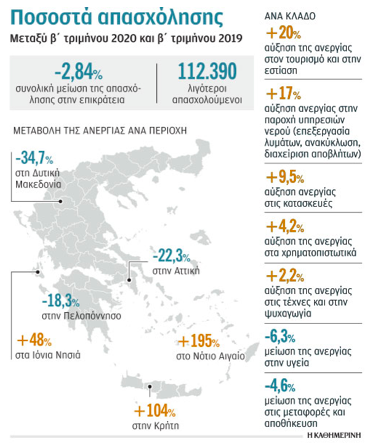“There are three kinds of lies: lies, damned lies and statistics”
Unattributed
The journalist Tasoula Karaiskaki, from the historic Greek newspaper Kathimerini, identifies the problem in relation to the impact of Covid-19 pandemic upon unemployment. In her article she reviews the recent paper ‘A Brief Overview on the Uneven Impact of the Covid-19 Pandemic upon employment and the young NEETs: Evidence from Greek regions and sectors’. The paper was prepared by the COVID-19 Regional Labourteam, the spin-off study of the YOUTHShare project. Ms Karaiskaki issues the verdict. Do numbers tell the truth? Well, not always!
Despite the general impression that employment in Greece has been significantly reduced, the official unemployment rate remains relatively unaffected. Why is that?
The 1st statistical “lie”
The number of inactive citizens has been increased; yet inactives do not count against unemployment! “The total number of unemployed people presents even a slight decrease of around 4.5% between the 2ndquarter of 2020 and 2019. At the same time there appears a significant increase of inactives. In reality the slight decrease of unemployment does not cover the significantly higher decrease of employment” stated Pr. Gialis, the Principal Investigator of both COVID-19 Regional Labour team and YOUTHShare. The situation is more alarming for the young people between 25 and 29 years old. Given their age, they are usually not in Education or Training and they should be in Employment. During the pandemic their unemployment rate mildly increases at 2,6% but the inactive young people of the same age group reach a stunning 40,5% increase! Being substantially demoralised they have stopped searching for a job during the pandemic.
The 2nd statistical “lie”
The grave regional and sectoral differences are conflated within the overall national rate. Unemployment of young people between the 2ndquarters of 2019 and 2020 skyrockets at 191% in Southern Aegean, 200% in Western Macedonia or 72% in Epirus. Especially island regions with labour intensive economies are witnessing an unprecedented situation. The 2008/9 crisis and the subsequent recession has mildly affected island regions with tourism-based economies. The recent health crisis, however, hammers the resilient-sensitive insular societies. 42.000 people lost their jobs in Southern Aegean, 35.000 in Crete and 13.000 in Ionian Islands during the quarters under investigation. As expected, accommodation and catering receive the strongest hit. But the marginal increases of the employment rate in other sectors such as health (to cover the increased needs for healthcare professionals) and logistics (to cover the increased needs for post, courier and door-to-door delivery professionals), especially in the metropolitan areas is veils the statistical image for other sectors or for peripheral regions.
Meaningful statistics have always been important. During crises such as Covid-19, their significance becomes paramount!



